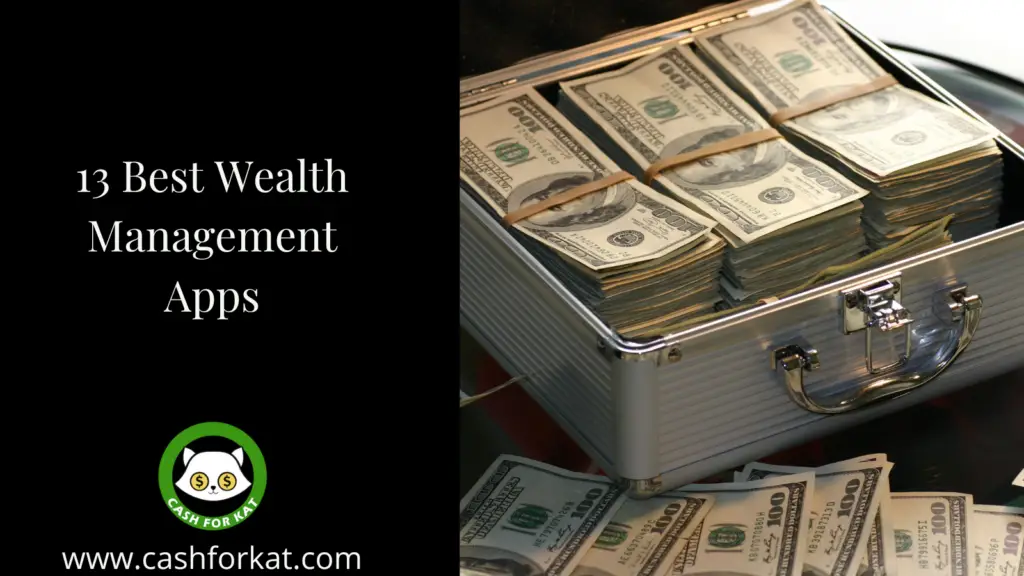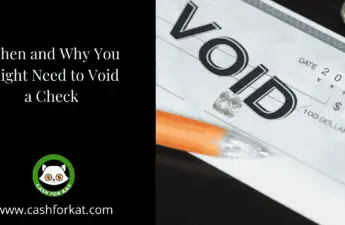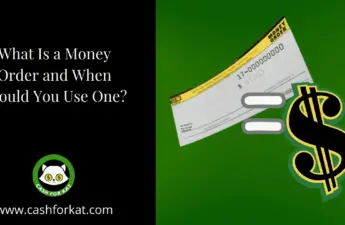
With so many options for keeping track of your money, it can become overwhelming to decide which financial tools you should use. That is why I wanted to pull together a list of the 13 best wealth management apps, along with the ones I personally use, so that you can pick the best one for you.
I’ve used most of these at one point or another, but have also added a few options that I’ve heard good things about.
The best part about this list is that you can select more than one wealth management app to help you!
Table of Contents
What are the best wealth management apps?
The best wealth management apps are the ones that help you take control of your finances. It is important to select a few that can help give you visibility into areas you are less certain about.
For example, Personal Capital and ChroniFI can give you an overall idea of what your financial present and future looks like. Acorns and Robinhood are excellent for those starting to invest. Digit and YNAB would be excellent selections for those who are just starting their savings.
Let your personal preferences, financial situation, and comfort level decide which apps to try out! Take a look at the list below to learn more about which apps might work for you.
Here are my top picks for the best wealth management apps to use this year.
Personal Capital
Developed by a wealth management company, Personal Capital offers free tools that can be used for budgeting and wealth management. Some great wealth management tools you should check out are their Net Worth Calculator, Retirement Calculator, and 401k Early Withdraw Calculator!
They have an amazing retirement planning tool that is a market leader. It pulls your data from other wealth management accounts into one location and consolidates it into a net worth tracker
Think of this app as a central location to keep track of any account you keep your money in: checking account, 401(k), IRA, HSA, and so on. Now you can quickly find your net worth without involving a calculator and 10 different bank passwords! Let technology do the heavy lifting for you.
Credit Karma
Credit Karma monitors your credit score for free! Whether you learn the easy way or the hard way, your credit score plays a HUGE part in your finances.
Though Credit Karma doesn’t provide direct wealth management tools, they will send you alerts when things change with your score. This is great for staying on top of your credit, which can result in better interest rates and increased eligibility for loans over time.
ChroniFI
I’m very excited to share information on ChroniFI because it is a newer personal finance app. I actually first heard about it when their founder, Ben Miller, reached out to me on Twitter. Since then, I’ve become such a fan of the platform that I am now an affiliate of it!
ChroniFi comes with many unique tools that are helpful for those who are pursuing Financial Independence/ Retire Early (FIRE). It is also a great fit for those who are curious about how their decisions today can impact their future finances.
From calculators to virtual sandboxes to test out different scenarios, ChroniFI is one of the coolest tools that I’ve come across!
Digit
Digit is a customized solution to help you save and invest. No two strategies look the same, and this is the fascinating process it follows to help you build your financial future.
To begin, Digit needs to learn about you and your spending habits. This includes questionnaires and viewing how money flows in and out of your bank account.
Next, the Digit algorithm pays attention to when you get paid and your spending habits. This allows it to seamlessly start saving on your behalf. The actual money amounts and transfer times are meant to be under-the-radar and convenient for you.
Digit avoids the “Sh*t! This stupid app took $1,000 out, my rent is due tomorrow and I don’t get paid until next week!” scenario by all costs.
If you want a hands-off approach where the app will do the work for you (without racking up bank overdraft fees on the regular), try out Digit and see what you think!
Mint
Created by Intuit, Mint quickly became the first stop for online personal financial management. This personal finance software is so popular that many banks even use it!
The app is widely used and can pull all of your information from a multitude of accounts. These include your credit cards, loans, checking accounts, investment accounts, and more.
It also offers a wealth of other features such as a personalized budgeting tool. This allows you to watch your wealth grow each month even if it is in multiple accounts.
If you are new to wealth management or budgeting apps, then Mint is a great place to start. Mint is completely free! However, it does make its money by placing ads on the website that are relevant to your browsing history.
Venmo
The mobile cash app, Venmo, allows you to transfer money in seconds with no fees. Venmo was acquired by PayPal in 2013 and has continued to expand its offerings. They now have their own debit card and even allow you to purchase crypto!
I used to use Venmo a lot when I was living in the US, however, this option is not very useful abroad so I’ve switched to Zelle by Chase for the time being. I do miss how simple the platform was to use and look forward to becoming a user again when I am back in the US.
Acorns
Investing is hard, and holding yourself accountable is the hardest part. Acorns is an app for people who have trouble making the jump into investing. Their most famous feature, and one of my personal favorites, is the ability to have my spare change invested for me. Here is how it works.
First, you create an Acorns account (and get a free $10 if you sign up using my link!) and link it to your debit card. You later buy lunch for $6.40. Acorns rounds up that amount to $7, investing the .60 of “spare change” you would receive if you paid cash. The 60 cents automatically moves from your bank account and is put into your Acorns portfolio for investing.
While Acorns does charge a small monthly fee, I still stand by my recommendation. If you know investing is important but need accountability and simplicity to get started, Acorns is a wonderful fit for you. Out of sight, out of mind. As time passes, this tiny acorn account will metaphorically grow into a mighty oak. Cute, right?!
You Need a Budget (YNAB)
You Need a Budget (YNAB) is an amazing app that helps you create budgets and stick to them. This wealth management tool has been around for years and was updated with all new features in 2017!
YNAB is not free but well worth the money for the advanced insight you receive. If you want to manage your wealth and save, this is a great tool that will help you get started. YNAB has 4 different levels of wealth management, starting at $5/month.
Mvelopes
As you may have guessed by the name, Mvelopes follows the envelope budgeting method to help you save money. Just like many of these platforms, you can sync your Mvelopes account with your bank to see all of your information in one place.
They have plans ranging from 5.99-189.99 and all of them allow you to set up as many envelopes as you need to get your finances in order. The more fancy plans also include access to a learning center and live coaching!
Splitwise
Splitwise is great for taking care of bills with your housemates. The app makes it very easy to keep track of who owes who money and even split up party expenses!
You can use the wealth management tools built into the app or just give it a try next time you have a group outing.
Human Interest
Human Interest, formerly Captain401k, is a 401(k) and 403(b) provider for small to medium-sized businesses. Their platform easily allows employees to see their retirement contributions, employer matches, and adjust their risk tolerance for automatic investing.
With a no-fuss platform, Human Interest makes investing straightforward for employees who may not be as familiar with building a retirement portfolio. They offer plenty of low fee funds, however, to select a specific allocation you have to contact them directly.
Two companies I’ve worked for in the past have used Human Interest. I’ve always enjoyed how straightforward it is to set up your preferences and let them handle the rest!
Pocket Smith
Pocket Smith originally started as a calendar that allows you to forecast how much money you will have on each day of the week.
It has since evolved to include more features. You can project your bank account balance up to 30 years in the future and play with “what-if scenarios”. There are even custom dashboards you can create yourself, which is a unique feature!
Their plans range from free to $19.95 a month and are a good combination for someone who wants to do overall tracking plus in-depth budgeting.
Robinhood
When you hear “Robinhood”, you might think of risk, uncertainty, and fear. You might even think of the AMC Gamestop media storm that dropped in early 2021. Even though Robinhood has received some negative media attention, they are still a reputable financial services company.
Robinhood is an investment app that offers standard access to the stock market. After creating your account, you can invest your money in any publicly traded stock, participate in stock options trading, and even buy cryptocurrency.
What I love about this app is (1) there are NO trading fees, and (2) you can trade fractional shares with as little as $1. If this sounds good to you, sign up here for one free share worth up to $100.
NOTE: If Robinhood is not your style, I got you! There are several alternatives that offer comparable access for no trading fees. Try exploring Fidelity, Webull, or Public and find the best fit for your financial needs.
Best wealth management apps FAQ
What are wealth management apps?
Wealth management apps are tools used to track your money and wealth. These apps usually include at least automatic savings tools, but may also include tools to help you invest, track your spending, etc.
Most wealth management apps are free. Even if the app isn’t free, they should at least have a free version to help you decide if you like it! The wealth management apps on this list are all designed with different goals in mind so hopefully one of them will fit the goals you’re trying to reach.
Which wealth management app is best?
My personal favorite out of all of these would be Personal Capital. I have been using it for years and find the ability to track my net worth to be incredibly valuable.
The tool is very user-friendly and the dashboards make it easy to see any changes with just a quick glance. The features of Personal Capital are useful to just about everyone, which makes it one of the most accessible apps on this list for those who do not know much about managing their wealth yet.
How can I track my wealth?
The tools on this list that can help you track your wealth include Personal Capital and any of the budgeting tools (YNAB, Mint, Mvelopes, etc). The main difference is just how detailed and hands on you’d like to be in your tracking!
Remember that you are not just limited to technology when it comes to wealth tracking. Many people like to create their own customized tools in Excel or Google Sheets to ensure their information is more secure and displays the way that is most useful for them.
Conclusion
Congratulations, you are now one step closer to owning your financial future! How do you feel?
Remember that this whole process is about achieving YOUR goals to achieve what YOU want from life. This is what keeps me going to help empower others with the tools they need. You should be in charge of your money decisions – not some old guy on Wall Street who sits behind a desk.
Here’s to great strides to achieve your version of financial success.


3 thoughts on “13 Best Wealth Management Apps (2023)”